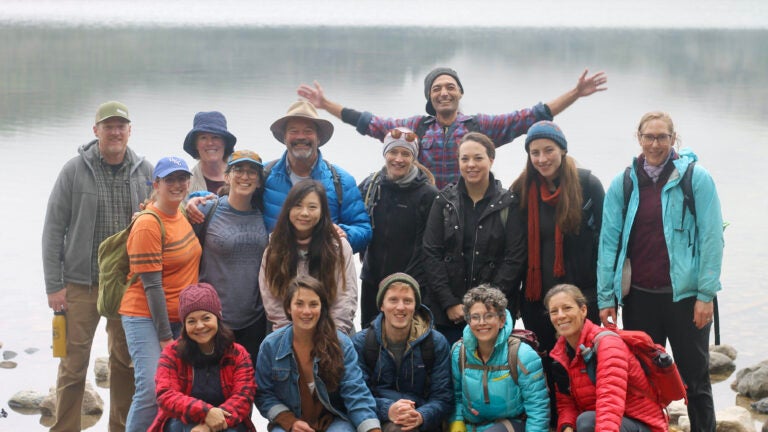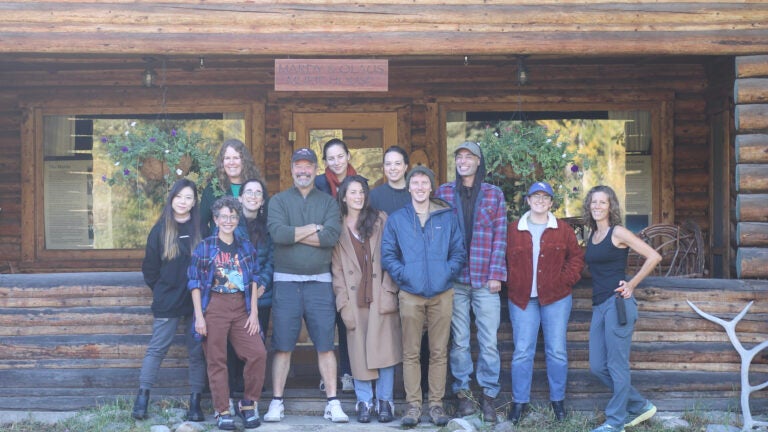Tetons Retreat Oct. 2022
Stephanie Arias
Stephanie Arias is a PhD student in USC’s Van Hunnick Department of History. A Southern California native, her research interests are mainly informed by her local community. At USC, Stephanie has explored research subjects related to immigration, labor, death in the diaspora, and policing in nineteenth and twentieth-century California, emphasizing Los Angeles.
Stephanie received a BA in History from Cal Poly Pomona. Her undergraduate career was followed by a decade of work at The Huntington Library in San Marino, California. There, she provided research support to a broad community of scholars and worked to increase accessibility to the library’s rich archives and resources. Now, as a doctoral student with professional experiences firmly rooted in archival research and methods, she looks forward to connecting borderland communities in California and beyond to shared histories of the West.
Email: sjarias@usc.edu
Abby Gibson
Abby Gibson is a PhD candidate in the Van Hunnick Department of History at USC. She received her BA in U.S. History and Film Studies from Pepperdine University in 2017 and her MA in U.S. History from the University of Oklahoma in 2019. While at OU, Abby worked as the book review editor for The Western Historical Quarterly as part of a two-year editorial fellowship. In the fall of 2019 Abby returned to southern California to pursue her PhD at USC. Her dissertation, “Fearful Land: Managing Terror in the American West, 1820–1920” reexamines the process of the American conquest of the West over the course of the 19th century through the lens of the history of emotions. She traces the terrors this region posed to an expanding nation across the 19th century and considers the mechanisms that enabled a settler nation and its people to surmount their fears of this place and emotionally “tame” the American West. Abby’s article, “Hamlin Garland’s ‘Mad Quest’ for the Buried Crosses” published in the Summer 2021 issue of The Journal of Alta California recently received a nomination from the Los Angeles Press Club for Best Creative/Performing Arts Feature over 1,000 words. This summer, Abby will jumpstart her dissertation research at the Autry Museum of the American West Archives and Library as the Visiting Scholar for Summer 2023.
Email: gibsonam@usc.edu
Tahireh Hicks
Tahireh Hicks is a PhD candidate in the Department of History at USC. Born and raised in Southern California, she completed her A.B. in History at Princeton University, where she received the C.O. Joline Prize in American History in 2017. Having returned to the West Coast for graduate school, Tahireh now centers her research on the entangled histories of California Indigenous and ethnic Mexican communities in Southern California. With a particular focus on the Orange County region, her work explores constructions of indigeneity and whiteness as both racial and legal categories within the intersecting frameworks of Spanish, Mexican, and U.S. empire in the nineteenth- and early twentieth-century West.
Email: tahirehh@usc.edu
Lauren Kelly
Lauren Kelly is a PhD candidate in the Van Hunnick Department of History at USC. Her research reframes a seminal event in water history of the U.S. West: the story of how Los Angeles seized water from Payahuunadü (the Owens Valley). Most scholars and the broader public understand this water transfer through the lens of the first Los Angeles Aqueduct, which the Los Angeles Department of Water and Power (LADWP) completed in 1913. However, to truly comprehend both the environmental and human impacts of LADWP’s water extraction, it is crucial to turn our gaze to the decades following this first piece of infrastructure. By providing a diverse and multi-generational study of one of the most famous water transfers in the U.S. West, Lauren demonstrates how resource extraction creates long-term, transformative relationships that are comprehensible only over a long time scale. Lauren’s project argues that, in our era of ever-increasing demands for water, this knowledge will help us craft plans to address water precarity that value all communities and landscapes.
Before coming to USC, Lauren got her BA in history from UC Berkeley. She’s dedicated to service to her department and broader community, serving her second year as the president of USC’s History Graduate Student Association and as a Graduate Student Representative for the Western Association of Women Historians.
Lauren is a PhD Fellow with the 2022-2023 Mellon Sawyer Seminar “Precarious Ecologies.” In addition, she has received fellowships and awards such as the 2022 and 2023 USC Wrigley Institute Graduate Fellowships for environmental studies and the John R. Hubbard Award for departmental leadership during the first year of the COVID-19 pandemic.
Email: kellylau@usc.edu
Amber Santoro
Amber Santoro is a second-year Ph.D. student in the Van Hunnick History Department at USC, where she studies race, displacement, and belonging in the nineteenth and twentieth-century U.S. West. Born and raised in Los Angeles County, Amber received her bachelor’s degree from Cal Poly Pomona, where she received the Pemstein Award and the 2022 Digital History Award.
At USC, Amber’s research explores the historical dimensions of environmental racism and transportation, with a particular focus on the impacts of freeway displacements on marginalized communities. Her scholarly journey reached a significant milestone when she became the inaugural USC Libraries Summer Primary Research Fellow, allowing her to advance her research on community displacement in Los Angeles. As part of this fellowship, she is actively curating a digital exhibit on the Century/105 Freeway, scheduled for release in Spring 2024. While primarily centered around archival materials from the Century Freeway records hosted by USC Special Collections, this exhibit will also consider other instances of twentieth-century freeway displacements in Los Angeles.
Amber’s latest research examines race, public health, naturalization, and education during the Progressive Era. Her focus on youth readership allows her to shed new light on the racialized narratives and ideals propagated by the mass publishing industry, emphasizing the intersection of moral reform, eugenics, and societal anxieties.
Email: ajsantor@usc.edu
Jhelene Shaw
Jhelene Shaw studies westward expansion, frontier newspapers, and nineteenth and twentieth century cultural history. She is a second-year PhD student who relocated to Pasadena from her native Colorado, where she received a BA in history and English from the University of Colorado. Her summa cum laude thesis analyzed recently-recovered pioneer testimonies and the boosterist impact of The New York Tribune. Her work at USC furthers these themes in investigations into early California town-building and class conflict as depicted on the pages of local newspapers. She plans to continue this work in her dissertation, dissecting the ideological complexity of blunt and bizarre nineteenth-century periodicals.
As much as she relishes the stylistic absurdity of these frontier editors, she strives for the opposite in her own work, for which she has received several best-of awards and scholarships. She recently realized a passion for teaching and hopes to combine teaching and writing in her future career. She currently serves on both the History Graduate Student Association’s executive board and the Cohen Lecture Committee at USC.
Email: jrshaw@usc.edu





